The Karimu Kids: Building Bridges of Wood and Culture: Part 4 of 4
Categorized as: Stories on September 28, 2013.
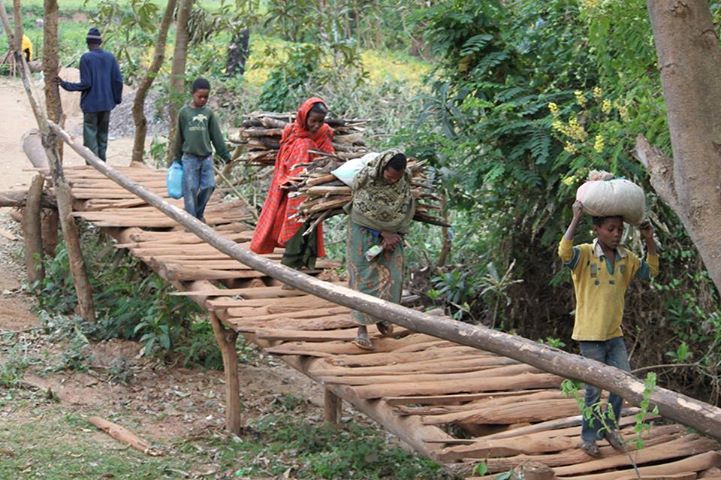
The last in our series takes you to this summer’s building of bridges of all types: a modern footbridge for residents to traverse during the rainy-season floods, an Internet bridge to communicate with the world, and an intercultural bridge of learning that’s changing lives on both sides of the Atlantic. Meet Karimu’s American professor and students from California State University Long Beach, who’ve learned far more from Bacho villagers than they ever hoped to impart.
Cover photograph: the old bridge. (Photo courtesy Karimu International) “This is the gruelling grunt work,” explains Karimu Board member Dr. Susan Hughmanick, “of passing seven tons of sand and seven tons of large gravel bucket-by-bucket across the rickety span of wooden planks we are trying to replace.” See the first video below, “A Bridge for Bacho Village,” for what this bridge will mean to Bacho.
By Suzanne Skees
Read Part 1 here.
Read Part 2 here.
Read Part 3 here.
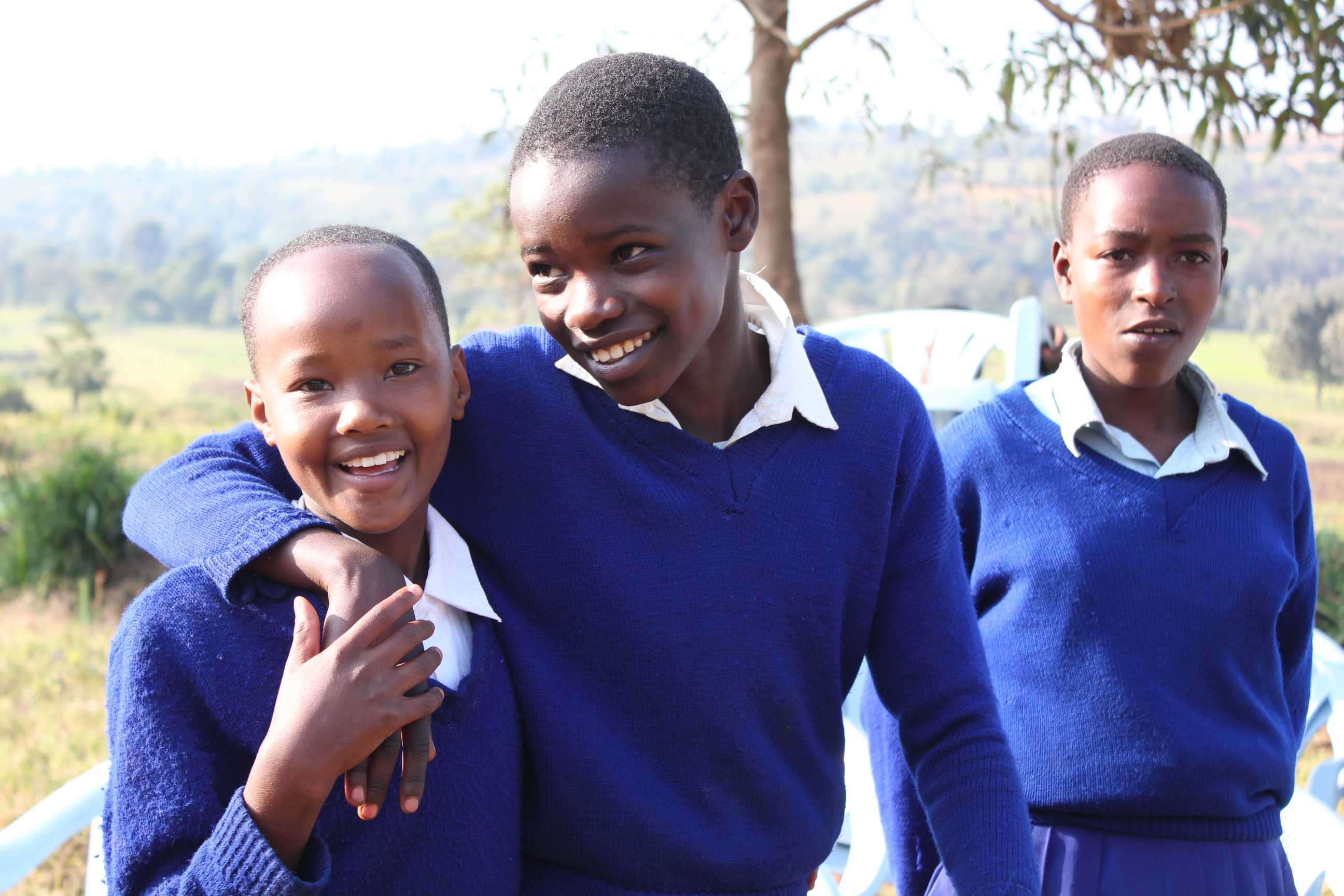 Ufani students. (Photograph courtesy of Carmela Llamoso)
Ufani students. (Photograph courtesy of Carmela Llamoso)
Building Bridges and Art
Bacho, Tanzania: Karimu International began with friendship and funds to build a clean pit latrine and save a primary school. Six years later, the Americans have brought baby blankets and midwifery training, refurbished schools and built new teacher houses, and launched a microcredit chicken-raising group and a crop-rotating farming collective. They’ve routed clean water to Bacho and funded electricity and Internet service for two new laptops donated by California State University at Long Beach (CSULB).
This summer, Karimu also sponsored a major project the villagers had long requested: a bridge to unite two halves of the village previously severed each winter by deep mud and rushing floods during the long rainy season. That’s not the only bridge they built: Karimu volunteers have always studied local Tanzanian culture, learning new skills from construction to dance . . . The CSULB theatre students who joined Karimu—many of whom had never before had a chance to travel outside California—came away this summer feeling they’d learned far more than they imparted.
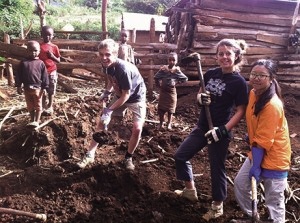 Volunteers happily hoeing the land for Ufani School’s new kitchen garden. Shirley Gong (far R), an Idyllwild Arts Academy student from Shenzhen, China, comments: “We worked so hard. My job was shifting the rocks. I’m not powerful, so lots of people helped me. I have never experienced anything like this before, so it is a real pleasure for me to be one of the volunteers in Tanzania. I love this trip.”
Volunteers happily hoeing the land for Ufani School’s new kitchen garden. Shirley Gong (far R), an Idyllwild Arts Academy student from Shenzhen, China, comments: “We worked so hard. My job was shifting the rocks. I’m not powerful, so lots of people helped me. I have never experienced anything like this before, so it is a real pleasure for me to be one of the volunteers in Tanzania. I love this trip.”
Together with Karimu volunteers in a group totaling 37, the CSULB students spent half of their time in Tanzania getting their hands dirty by hoeing gardens, hauling bricks, and gathering wood for the many “build projects” slated for summer 2013. (See bullet list below for this year’s accomplishments.) They spent the other half working with Bacho students to fulfill requirements for “Theatre Today,” a three-credit course at CSULB designed by Professor Anne D’Zmura, chair of the theatre arts department. Anne has brought thirty students from California to Bacho over the past three summers.
The idea for the course emerged from the glowing face of a CSULB student and four-time Karimu volunteer, Cassandra Babcock, who returned to university one year from a summer trip to Tanzania. “She looked even more beautiful and happy than she normally does,” Anne laughs. “I said, ‘What did you DO over the summer? I want me some of that.'” Cassandra explained the work of Karimu and the play she’d directed with young Bacho students that summer around malaria prevention. Intrigued, Anne contacted Don Stoll and Marianne Kent-Stoll and began to design a credit course for Cassandra and her classmates at CSULB.
“We’re very busy during our time in Bacho,” notes Anne. “Just to reach the Ayalagaya [Secondary] School means an hour’s hike uphill.” The students relish being active and creating buildings and the new bridge; however, for Anne, “It’s about far more than that: It’s about the interaction with the villagers.” U.S. students collaborated with Tanzanian students of all ages to create “issue-driven, community-based arts projects” based on the model of Cornerstone Theatre Company, a multi-ethnic, community-collaborative ensemble that creates stage productions around such issues as racism, hunger, and work. Bringing this hands-on course to Bacho, Anne and her CSULB students spent their long summer afternoons in discussion and production planning.
“We conduct story circles and interviews,” Anne explains. “We create art together; we write scripts together.” All of that creative input aggregates into a series of dramatic performances on the final day of their two-week visit. Not only do CSULB students have required reading in community-based theatre and a crash course in rural African village life, they also learn local dances of the Iraqw tribe here, and they learn enough Swahili to converse with Bacho students and to perform their plays in both English and Swahili.
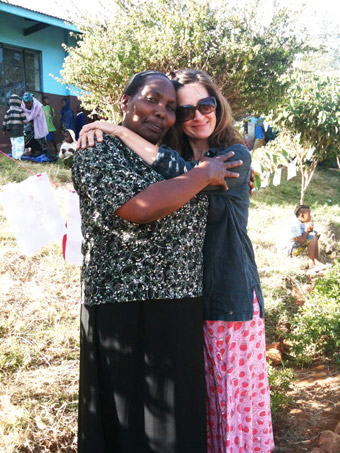 School administrators unite: Ayalagaya Secondary Headmistress Catherine Boay Buxay (R) and California State University at Long Beach Professor Anne D’Zmura (L) became good friends working together the past three summers. (Photograph courtesy of Karimu International)
School administrators unite: Ayalagaya Secondary Headmistress Catherine Boay Buxay (R) and California State University at Long Beach Professor Anne D’Zmura (L) became good friends working together the past three summers. (Photograph courtesy of Karimu International)
This summer, performance pieces focused on three top-of-mind issues:
1. Technology pros and cons, as Bacho teachers connect with the world via new laptops and Internet access, and youth obtain cell phones with all the texting and games they’ve long craved.
2. Open fire health risks, as some villagers have continued to cook over open fires rather than adopt the smaller, cleaner rocket-stoves donated by Karimu.
3. Bridges, both mechanical, as in the new bridge connecting the two sides of Bacho, and cultural, as in the two-way learning occuring with each summer visit that will now be possible year-round via email correspondence, open-source classes, and social media.
American University Students Share Takeaways, in Their Own Words
Three American students felt themselves deeply transformed by their study in and of Tanzania. They share their impressions in their own words, below.
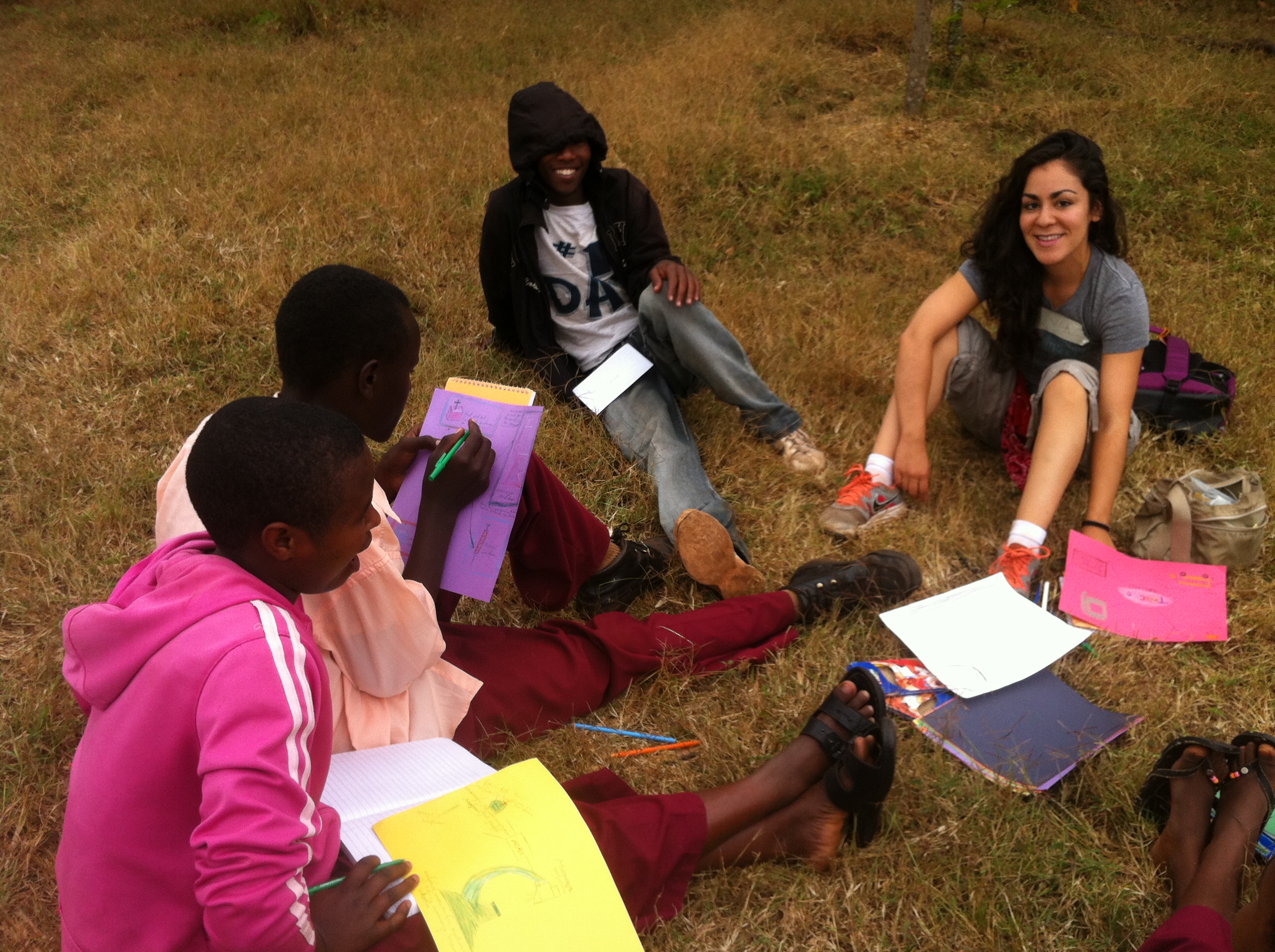 Olivia Treviño (R) of CSULB works with students from both schools to transform their social issues into dramatic art. (Photo courtesy of Jennifer Lares)
Olivia Treviño (R) of CSULB works with students from both schools to transform their social issues into dramatic art. (Photo courtesy of Jennifer Lares)
Olivia Treviño: “I have never been happier than when I was in Bacho”
Olivia Treviño, a 2009 theatre department graduate of CSULB, has volunteered with Karimu in Bacho for two summers. This year she served as a teaching assistant to Professor D’Zmura, working with primary and secondary students in creating dramatic productions based on social and technological issues.
“The time I spent in Bacho Village was the most transformative, enlightening, and invigorating experience of my life. I witnessed firsthand the potential that art has to:
- empower the youth of a developing nation,
- plant seeds of positive social change in a rural community, and
- transcend cultural boundaries to form life long friendships.
While the villagers are extremely grateful for the tangible work we do in their village, they are unable to fathom the unprecedented value of what they give us: a widened perspective that reminds us to live in the moment, focus on what is truly important, and celebrate life to the fullest extent. I have never been happier than when I was in Bacho and, since my return, have found new joy in my life in the United States. This was my second trip to this spectacular place, and I know it will not be my last. Bacho Village is my second home, as it will be for any who embark on this life-changing journey.”
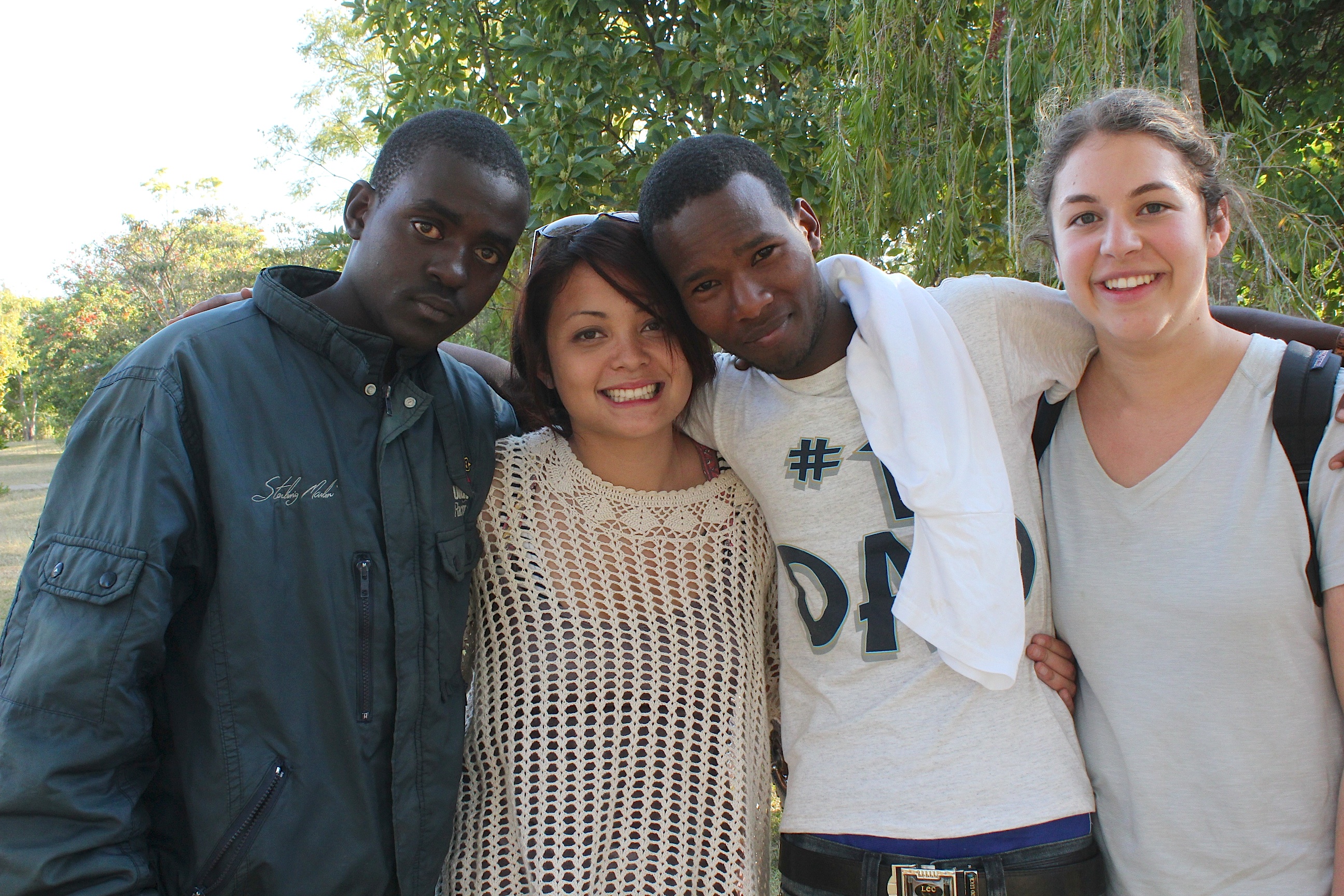 Students together (L to R): Edmund, Carmela, Alfred, and Sam worked hard and had their share of fun this summer together.(Photograph courtesy of Carmela Llamoso)
Students together (L to R): Edmund, Carmela, Alfred, and Sam worked hard and had their share of fun this summer together.(Photograph courtesy of Carmela Llamoso)
Carmela Llamoso: “Young people like me need to find in themselves the capability to help others”
Carmela Llamoso was born in the Phillippines and moved to the U.S. at age ten. She graduated in 2013 in film and electronic arts from CSULB. Camera in hand, Carmela spent her first visit to Bacho creating a cache of photographs and a series of documentary films on the village. See her first completed project below: the second film entitled “CSULB in Bacho.”
“Our [CSULB’s] course’s main focus was to develop and perform community-based theater with the students of Ufani and Ayalagaya, where we helped them identify and interpret significant topics and issues within their community and within themselves. We helped the Ufani children write a song about the bridge that Karimu was helping to build near their school, and what that bridge meant to them. And after facilitating healthy debates and discussion about the pros and cons of new technology entering their world, we worked with the Ayalagaya students to compose and perform a song that integrated their own arguments. Both of these pieces were performed at the closing ceremony, along with a health piece that we CSULB students wrote and performed about the dangers of using open flames in cooking, encouraging women of the village to use the environmentally friendly stoves that were donated to them by Karimu.
This experience has greatly helped me in realizing my capabilities as teacher, volunteer, and friend in a community very different from what I am used to. After my experience with Karimu’s volunteer efforts and my school’s involvement with the support of their organization, I realized that young people like me need to find in themselves the capability to selflessly help others, and how rewarding that ends up being for everyone involved. And I learned compassion above all else, after my conversations and interactions with the children, and the bonds we’ve all made with the people of Bacho.”
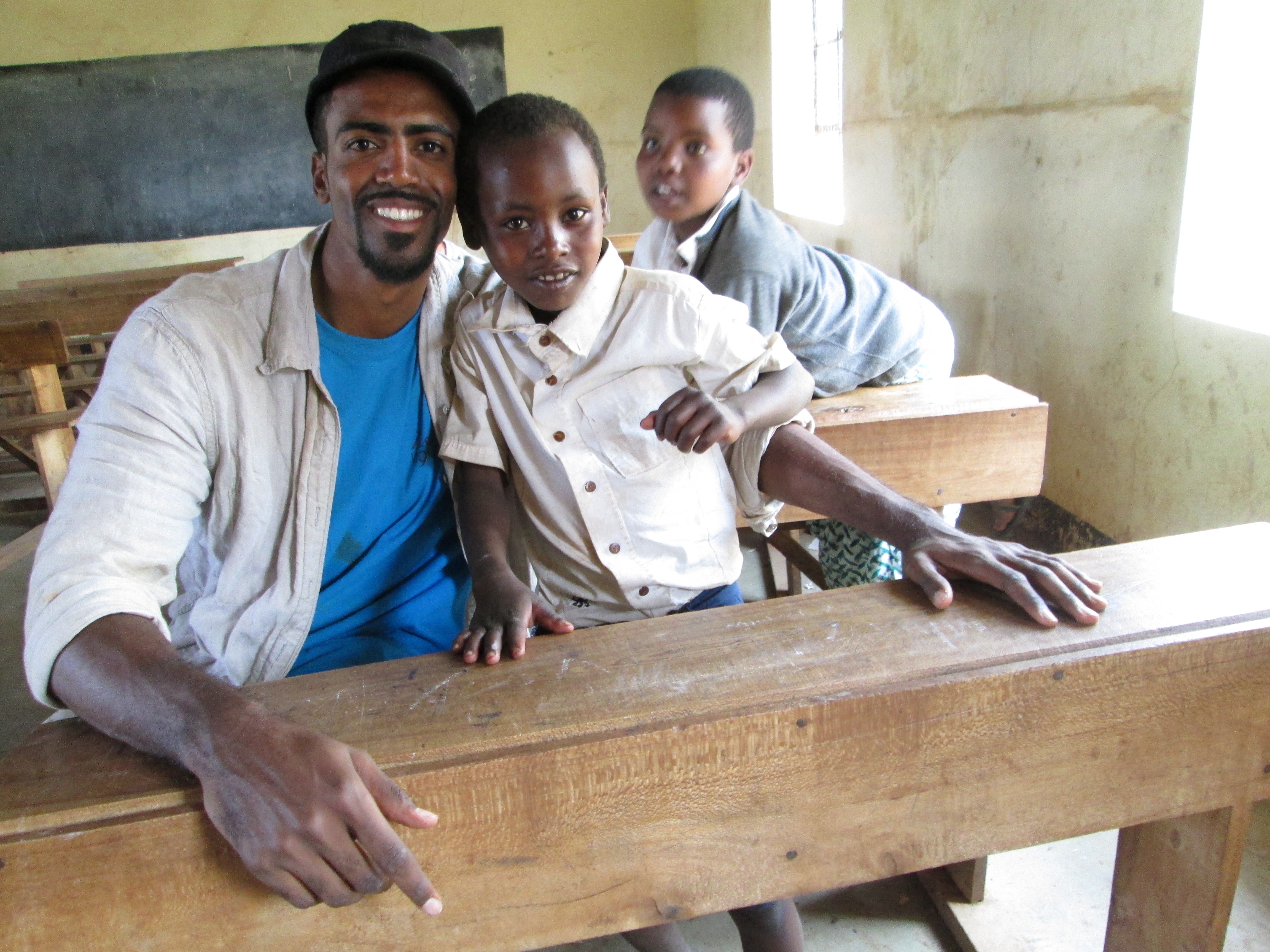 Londale (L) goofing around with students from Ufani Primary School. (Image courtesy of an eager young Ufani photographer)
Londale (L) goofing around with students from Ufani Primary School. (Image courtesy of an eager young Ufani photographer)
Londale Theus Jr.: “These students have to go through so much just to get an education, and every single one wanted solely to help their people”
Londale Theus Jr., a 26-year-old professional actor and comedian, traveled to Bacho with Karimu for two summers (2011 and 2012) when he was a theatre major at CSULB.
“I worked as a volunteer with Karimu in the construction of Teachers’ Houses as well as classrooms, and worked with the CSU Long Beach study-abroad class in the engagement of the Ufani Primary school students and the Ayalagaya Secondary school students to build a performance piece that highlighted the issues that they cared about (such as the health of their environment in relation to the growth of the construction of roads, the professions they wanted to work in and what their impact would be, etc.).
The most challenging part of the experience was breaking through the language barrier in order to get to the core of how the students truly felt about our involvement in their community, what they aspired to be, and how they wanted to create change. But once they opened up it was such an amazing gift to be given an opportunity to work with them. Their generosity and excitement changed the way I approach my daily life and work because these students have to go through so much just to get an education, and on top of that every single one of them wanted to work in a profession (teacher, doctor, politician) solely so that they could help the people of Tanzania. I never heard any of them say, ‘I want to be this, so I can be rich and successful.’ It was always, ‘I want to be this, so I can help my people.'”
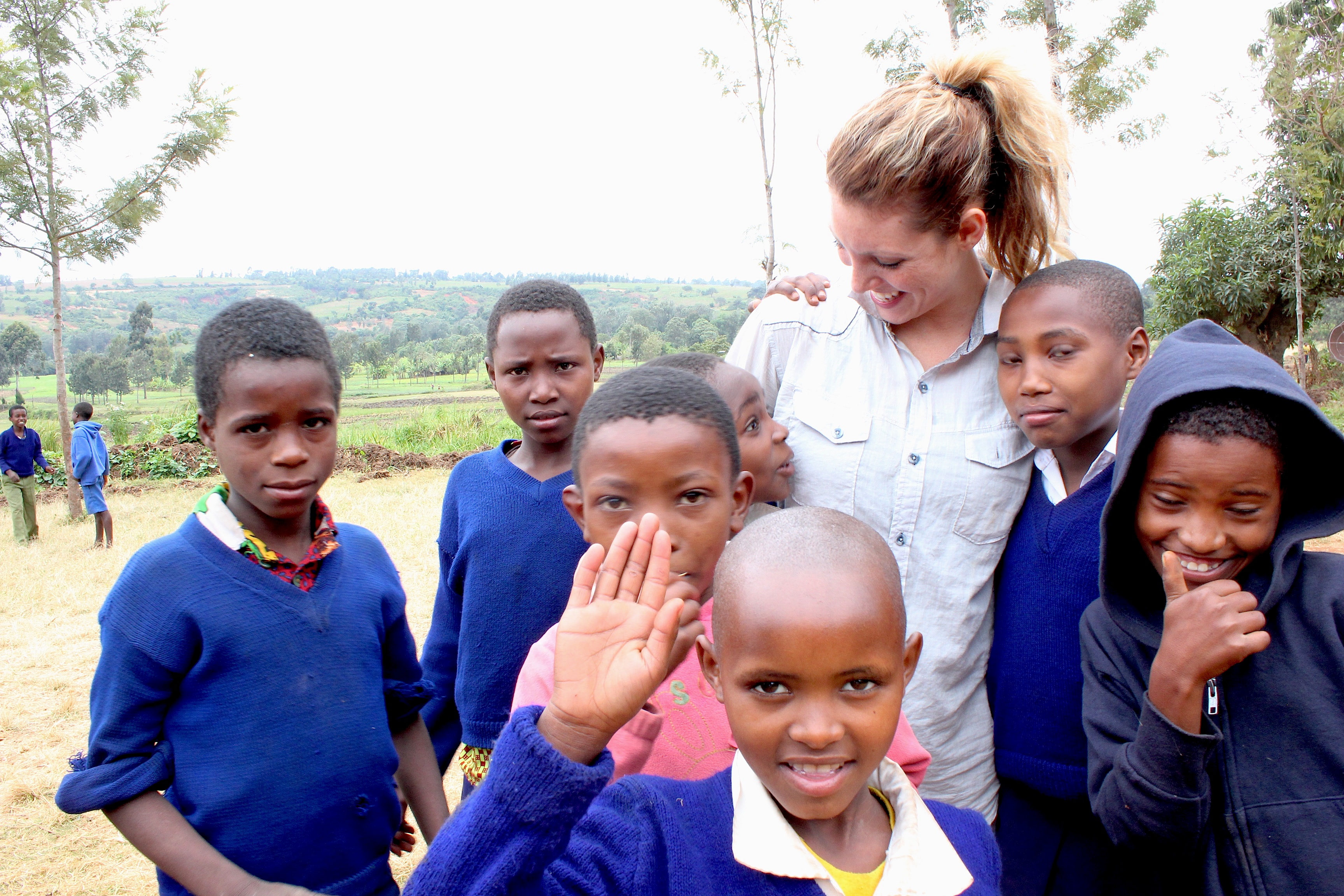 Amber Rose Eisman with Ufani students. (Photograph courtesy of Carmela Llamoso)
Amber Rose Eisman with Ufani students. (Photograph courtesy of Carmela Llamoso)
Packing up to leave for a few days’ safari and then the long trek home, Anne reflects on the longterm effects this trip will have on her American students—and her. “I try to challenge my students to consider how they’ll integrate social activism into their lives back home.
“What happens upon our return, is that we start to question everything we think we need,” she says. One student, after hauling water and firewood for two weeks, came home and just stared at his microwave, wondering why he should have it so easy. Anne was struck by how much she spent on food: “If I spend $100 on groceries, for another $200 I could fund a [Tanzanian] student for a year.” She says she still works “14 hours a day, 7 days a week; but because of Tanzania, I’m more aware of slowing down and really connecting with the person in front of me. They have a beautiful way and saying here, pole pole, slowly slowly. It’s about being present.”
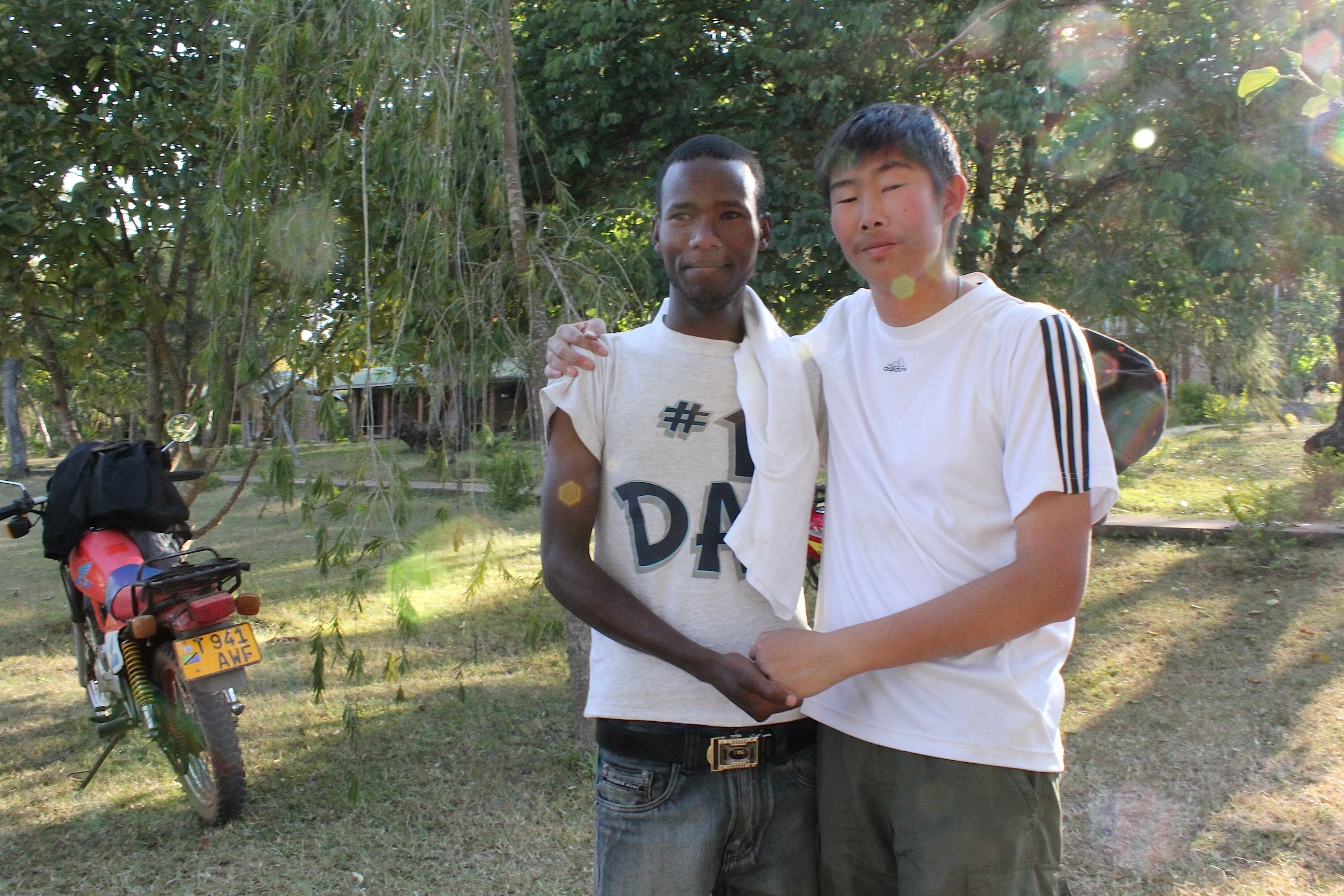 Alfred and Brennan. (Photograph courtesy of Carmela Llamoso)
Alfred and Brennan. (Photograph courtesy of Carmela Llamoso)
“Being in Bacho makes us reassess our values,” she muses. “You ask: What will you let go of yourself? One student, Eriko Azuma, started a theatre company in L.A. with a very intentional social-mission focus. Another, Jade Clarke, plans to work in health administration ensuring healthy births around the world. You don’t have to go back to Africa to do this work.”
Accomplishments from this summer (2013):
- Partnered with Bridging the Gap Africa to build a suspended bridge (to withstand torrential rains and floods)
- Built a house for two teachers and their families at Ufani Primary School
- Funded a farm at Ufani School to help supply the children with school lunches
- Donated funds for two more large, fuel-efficient stoves at Ayalagaya Secondary School
- Brought two laptops, electricity, and Internet access to Ayalagaya Secondary School
- Donated more funds to UFAGRO, an agricultural microcredit group that shows great success with 47 members
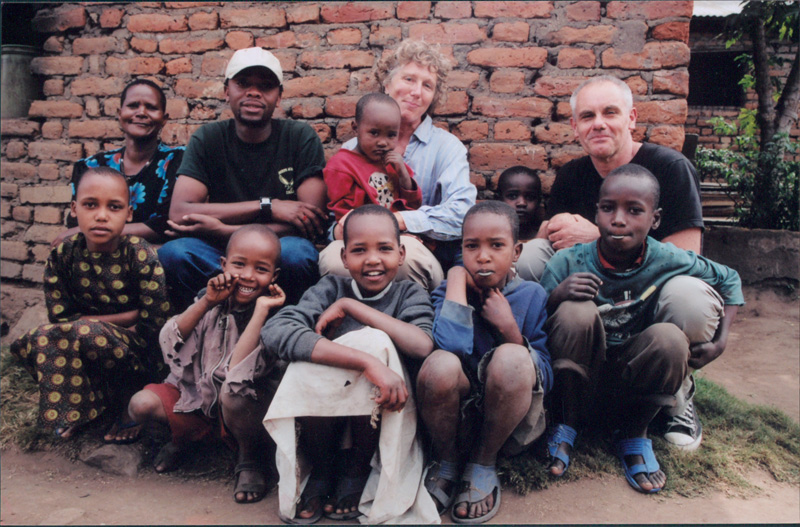
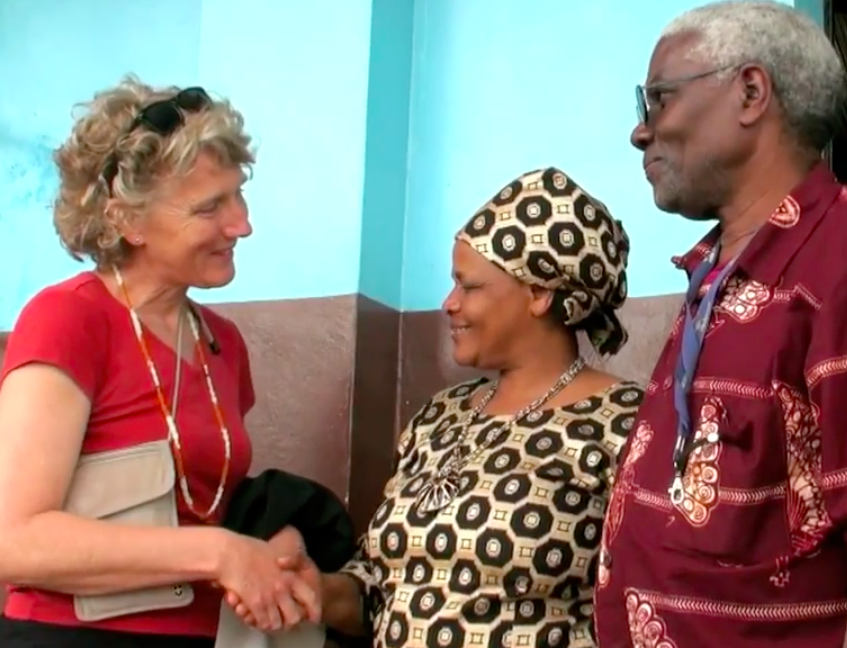 The Kwaslema family, with whom Marianne and Don lodged during their first visit to Bacho, as tourists, in 2007; and Marianne with Board member Joas Kahembe and his wife, doing grassroots development, Karimu style.
The Kwaslema family, with whom Marianne and Don lodged during their first visit to Bacho, as tourists, in 2007; and Marianne with Board member Joas Kahembe and his wife, doing grassroots development, Karimu style.
Upcoming projects:
- Supply clean water to Bacho Primary School
- Begin renovation of Dareda Primary School
- Find a way to support the village stove-making cooperative
- Continue to support UFAGRO agricultural microcredit group
- Continue to build teachers’ houses at both Ufani Primary School and Ayalagaya Secondary School
- Look into possibilities of promoting more health education in the schools and the community
Travel to Tanzania with Karimu to see their current projects and view the old bridge, just as they began work to replace it in 2013. Click here or watch the embedded video below:
Share some of the final performance skits and music of California State University Long Beach students with the Kids of Karimu from summer 2013 in Tanzania. Click here or watch the embedded video below:
Film “A Bridge for Bacho Village” by Peggy Seltz for Karimu International; film “CSULB in Bacho” by Carmela Llamoso for Karimu.
LEARN more about the work of Karimu International Help Foundation here.
SHARE this story with your networks; see menu at top and bottom of page.
DONATE directly to Karimu Foundation here.
SUBSCRIBE! Like what you see? Click here to subscribe to Seeds of Hope!
